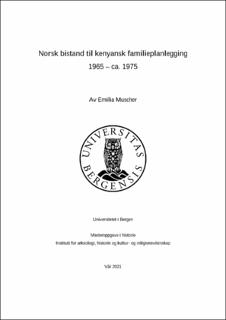| dc.description.abstract | This thesis aims to analyze Norwegian aid to Kenyan family planning from 1965 to the mid-1970s. The main research question examines which reasons can be uncovered as to why Norway and Kenya established a cooperation on aid for family planning in 1967. Furthermore, it analyzes what this aid consisted of and entailed, as well as how Norway pursued its work on family planning aid in Kenya. The time frame of the thesis is from 1965 to circa 1975. The thesis answers the research question in three parts, each of which are explored in individual chapters. The first chapter examines the commencement of the Kenyan-Norwegian relationship regarding aid intended to be used for family planning, and aims to explain why Kenya became the first country to receive such aid for its family planning program. The second chapter investigates the aid provided by Norway to the program and similar projects. It looks into what the aid entailed, and why the Norwegian bilateral aid to the program stopped in 1975. The last analysis chapter employs an international perspective by discussing how Norway cooperated with different organizations and countries, bilaterally and multilaterally, regarding family planning in Kenya. Additionally, Norwegian and international politics are explored to shed light on differences in politics in Norwegian bilateral and multilateral aid. Furthermore, the chapter explores whether or not there was pressure from international actors, such as the Population Council, on the Kenyan government concerning its family planning. Throughout the three chapters, the development of Norwegian politics on international family planning has played a crucial role. This aspect has shown both the perceived population issues and how the proposed solutions for them altered over time, and how Norway differed from other actors in the population control movement of the 1960s and 1970s. The thesis finds that there were several factors which led to the cooperation between Kenya and Norway regarding family planning. Family planning becoming a part of Norwegian aid in 1966, and the Kenyan engagement for family planning are two. Furthermore, Norwegian bilateral aid can be considered a small contribution to the program, however, Norway made large contribution multilaterally to the Kenyan family planning program. There was international pressure on the Kenyan government to lead the program a certain way, however the government continuously led the program towards the solutions which it meant best suited its population. Lastly the thesis shows that the international and Norwegian politics on family planning internationally differed. | |
